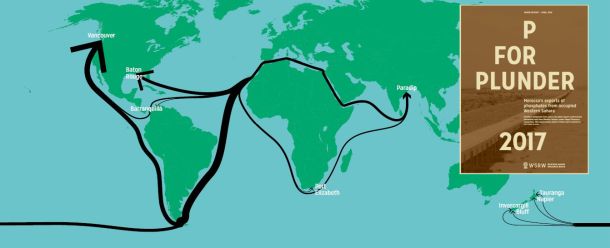
“We planted 808 trees in Boujdour, Morocco”, Siemens Gamesa boasts, as it for the umpteenth time forgets which country its controversial project is actually located in.
Photo: Demonstrators in front of Siemens Gamesa's AGM on 24 March 2022. Picture by Western Sahara is not for Sale.
"Siemens Gamesa still cannot seem to understand which country it is operating in. It appears that Siemens Gamesa does not care much about basic principles of international law. After a decade of protests against its energy projects with the Moroccan king in Western Sahara, the company can not even state the name of the country where the operations are taking place”, stated Sara Eyckmans, coordinator of Western Sahara Resource Watch.
Very recently, probably at one point in February or March 2022, Siemens Gamesa yet again chose to refer to the territory as being in Morocco. On its website, the company stated that the location where it undertakes a project with a Moroccan NGO is "Boujdour, Morocco" [or download].
“With this Forests we planted 808 trees in Boujdour, Morocco with our partner HAF following our goal to create the Forests of Siemens Gamesa all over the world"; the company proudly announced.
HAF - or High Atlas Foundation - is a Moroccan NGO that explicitly states that it works politically for the interest of Morocco.
“My people is not interested in your partnership with Moroccan organizations to spread propaganda that my country is in fact part of Morocco”, Saharawi activist Nayua Jatri Aduh stated at the Siemens Gamesa AGM on 24 March 2022, in relation to the tree planting in “Boujdour, Morocco”.
Siemens Gamesa stated at its Annual Meeting on 24 March 2022 that it supports the UN efforts, but the company still just can't seem to get the geography right. The Siemens Gamesa statement on the alleged geographical location of Boujdour follows a trend in which all references to Western Sahara are systematically ignored.
- As Siemens Gamesa announced the contract for the controversial Boujdour project in Western Sahara in September 2020, the company announced that the new project for supplying wind turbines was “for the Boujdour wind farm, located in the South of Morocco”. That particular and erroneous press release is still found on the company's website. When the former mother company Siemens AG first entered Western Sahara in 2012, it used similar wording.
- In its 2019 Management report, Siemens Gamesa refered to two different Boujdour projects as in “Morocco" [or download].
- A Siemens Gamesa press release on 7 October 2021 called the project in “Morocco”, though the release was immediately removed after WSRW covered the issue.
The company's consistent references to the territory as "Morocco" occur in total disregard of UN terminology and five rulings from the Court of Justice of the EU.
All references to the fact that the company has supplied anything to Western Sahara are completely removed from all public reports, including in the Communication on Progress reports to the UN Global Compact, the latest of which was published in April 2021.
Siemens Gamesa often refers to its undisclosed legal assessment that supposedly qualifies its activities in Western Sahara as compliant with “applicable laws”, yet it systematically evades all questions as to which country's laws it claims to be applicable in Western Sahara.
The last time that happened was at the company's Annual Meeting on 24 March 2022.

Since you're here....
WSRW’s work is being read and used more than ever. We work totally independently and to a large extent voluntarily. Our work takes time, dedication and diligence. But we do it because we believe it matters – and we hope you do too. We look for more monthly donors to support our work. If you'd like to contribute to our work – 3€, 5€, 8€ monthly… what you can spare – the future of WSRW would be much more secure. You can set up a monthly donation to WSRW quickly here.
New report: Western Sahara phosphate trade halved
The export of phosphate rock from occupied Western Sahara has never been lower than in 2019. This is revealed in the new WSRW report P for Plunder, published today.
Siemens again refuses to answer questions about Western Sahara at AGM
For the fourth consecutive year, the German engineering company dodges questions at its Annual Shareholders Meeting as to whether it has obtained the consent of the people of Western Sahara to operate on their land.
New report on Western Sahara phosphate industry out now
Morocco shipped 1.93 million tonnes of phosphate out of occupied Western Sahara in 2018, worth an estimated $164 million, new report shows. Here is all you need to know about the volume, values, vessels and clients.
New report on contentious Western Sahara phosphate trade
Morocco shipped over 1.5 million tonnes of phosphate out of occupied Western Sahara in 2017, to the tune of over $142 million. But the number of international importers of the contentious conflict mineral is waning, WSRW's annual report shows.



